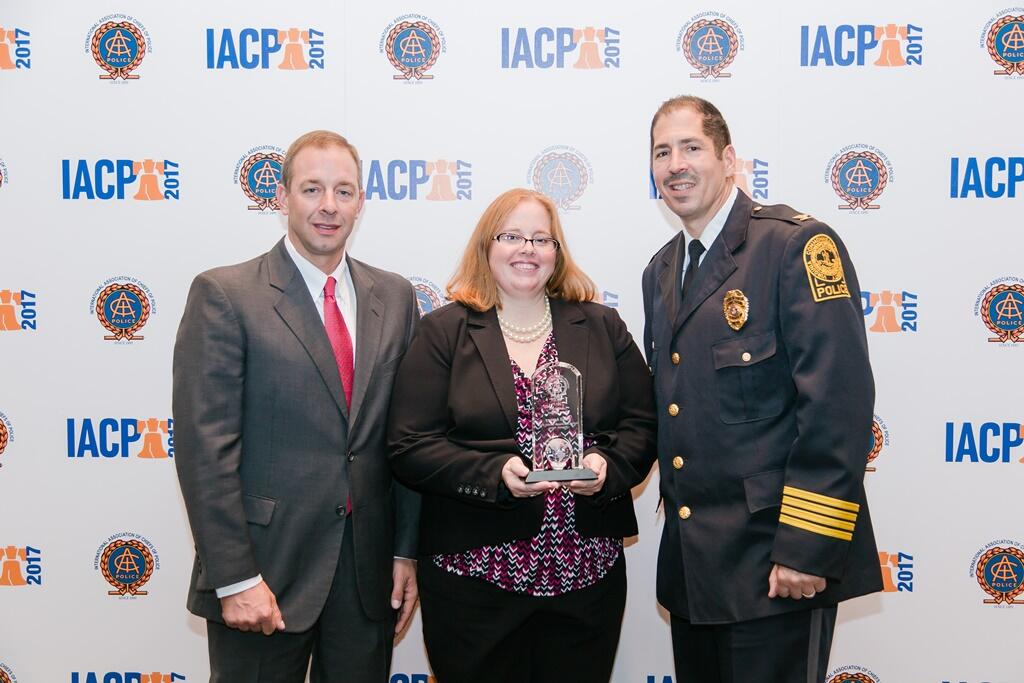Oct. 25, 2017
VCU Police receive international Leadership in Victim Services Award
Share this story

In the aftermath of a traumatic, troubling and often unexpected crime, victims and witnesses are commonly at a loss as to what to do next — or what help they can receive.
Since 2010, the Virginia Commonwealth University Police Department has been working purposely to improve its response to people who come forward after a crime has been committed.
After expanding training for officers, dedicating an officer to coordinate victim-witness services and collaborating extensively with partners at VCU and in Richmond, VCU Police has been recognized for its victim-centered practices by an international policing agency.
On Oct. 24, the International Association of Chiefs of Police (IACP) awarded VCU Police with the IACP Leadership in Victim Services Award. VCUPD was one of two award winners, taking the top award in the small agency category. The award honors agencies that use innovation, problem-solving, best practices, partnerships, training and monitoring tools to better their responses to crime victims. VCUPD was a runner-up for the same award in 2015.
“Being compassionate and empathetic to victims, and witnesses, is something that has been at the forefront of how we respond to all criminal incidents,” said VCUPD Chief John Venuti. “Working with each person who comes forward helps us build trust and allows us to help them navigate what services they may need.”
When a crime victim or witness comes forward, a specially trained officer, known as a victim-witness specialist, meets with the person to gauge their needs. Victims may need immediate medical attention or a health assessment, counseling, financial assistance, or may want to speak with a confidential victim advocate; VCU Police officers make sure the person gets whatever support they need.
In 2007, the agency had six officers trained to respond to victims of violent crime. In 2013, Venuti designated Cpl. Tricia Mozingo as the full-time victim-witness coordinator. Today, VCUPD has 16 victim-witness specialists in the patrol division.
All VCUPD personnel have been trained to work with victims in a trauma-informed manner — a practice that is especially important when sexual assault survivors come forward to police. In 2016, the department implemented the You Have Options Program for sexual assault survivors, which provides options for reporting to police, and the university, and makes sure each person knows how reporting processes work.
Mozingo believes word has spread in the community that VCUPD provides solid support to victims.
“Students and staff have come to realize that VCUPD will go above and beyond to help them claim a sense of normalcy after an incident,” Mozingo said. “Because of this, the community members trust that any report they file with the department will be taken seriously, regardless of the nature of the offense.”
As VCUPD transitioned from its old headquarters on West Grace Street to a new headquarters between VCU’s two campuses, Venuti opted to plan the new space in accordance with YHOP’s best practices.
He designated two soft interview rooms that officers and detectives use to speak with crime victims and sexual assault survivors. The rooms are similar to rooms at a counselor’s office, with couches and soft lighting, to put people at ease when recounting difficult circumstances.
VCUPD also utilizes the following methods to meet survivors, victims and witnesses needs:
- Arranging court transportation and assistance with extending protection orders
- Updating a victim when an offender is served with a protection order, or arrested
- If an offender is taken into custody, an officer will register the victim in the Virginia V.I.N.E. Network to receive notifications by email, phone or text when the offender is released from jail
- If a person suffers injuries as a result of a crime, specialists can assist in filing a claim on behalf of the victim with the Virginia Victims Fund
- VCUPD assists with accommodations to limit or eliminate contact between the perpetrator and victim
- To avoid re-victimization, officers make every effort to limit the number of times a victim must tell their story
VCUPD works routinely with internal partners, including VCU's Wellness Resource Center, Student Affairs, Student Counseling/Health, Residential Life, Title IX and VCU Health's Forensic Nurse Examiners.
External partners include the Virginia Attorney General’s Office, Richmond Police Department, the Richmond Commonwealth Attorney’s Office and the Richmond YWCA.
VCUPD conducts an annual perception of safety survey. Using data from this survey, police adjust services and responses to better serve the VCU community. Based on meetings with subgroups in the community, such as the LGBTQIA+ community and the Muslim Student Association, officers have assessed the challenges and cultural differences experienced within these groups to serve them better — and to encourage crime victims to feel more confident in working with police.
Even if a VCU student or staff member has experienced violence off-campus, or in another city or state, an officer will still help that person get help.
Since 2014, VCUPD's victim-witness officers have had 3,874 contacts with victims; this includes people who are VCU-affiliated, but experienced a crime out of VCUPD jurisdiction. Officers contacted each person and provided information on resources, crime prevention and accommodations.
The number of contacts include those involved in incidents including (but not limited to) robberies, sexual assaults, assaults, stalking, dating violence, theft, identity theft, and mental health crises.
“Our goal is for every person who comes forward to be treated with respect and to receive appropriate support,” Venuti said. “At this university, we want each person to succeed. The last thing we want is anyone who may already be experiencing trauma to be overwhelmed by the criminal justice process.”
Subscribe to VCU News
Subscribe to VCU News at newsletter.vcu.edu and receive a selection of stories, videos, photos, news clips and event listings in your inbox.









